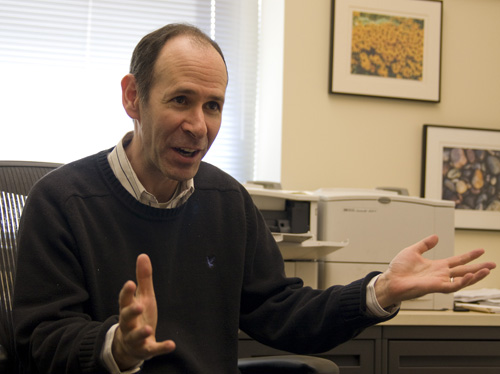Study: carpools save money, gas

Sheldon Jacobson, a professor in the computer science department and co-author of a paper entitled “Fuel Savings and Ridesharing in the US: Motivations, Limitations, and Opportunities,” discusses the paper in his office in the Siebel Center on Tuesday aft Erica Magda
Jan 22, 2009
Last updated on May 13, 2016 at 06:55 p.m.
BY EMILY BARDALES
STAFF WRITER
It is no surprise that ride sharing or carpooling can save money and help the environment, but few are taking advantage of this opportunity.
Sheldon Jacobson, a computer scientist at the University, and Douglas King, a graduate student and Ph.D. candidate conducted a study figuring out the statistics for the savings that would come with ride sharing.
Get The Daily Illini in your inbox!
They used government transportation data and found that if one passenger was added to every 100 vehicles instead of that added passenger driving individually, it would reduce annual fuel consumption by 800 billion gallons of gasoline.
“The data that we used is all publicly available; none of it was for us specifically. It was data that we were able to find in public databases and then use to create these models,” King said.
If the driver would have to do a significant amount of traveling to pick up the carpoolers, then money and fuel savings could potentially be eliminated, the researchers said. Students can consider these possibilities when returning back to campus.
“When we started doing this research, gas was between two to four dollars per gallon,” Jacobson said. “But surprisingly, price of gas was one of the less significant issues,”
A more significant factor was the length of the drive. People are more likely to carpool for company than to save money on gas on long drives.
“My parents don’t like me driving back to school alone, in the case that anything ever happened,” said Meagan Brown, sophomore in LAS. “So I don’t make people pay when they come back with me. It’s always better to have company coming back.”
Jacobson feels that people need more incentives for using public transportation and ride sharing in order to really minimize the number of cars on campus.
“If the parking cost on campus was increased, it would encourage people not to bring their cars to campus, decrease congestion of vehicles, make the campus more walker-friendly and reduce the risk of accidents,” Jacobson said.
Brown pays $135 to park in Urbana for the school year.
These incentives would mean added costs for driving alone, such as parking costs and toll costs.
“If you increase those, although it would be very unpopular, it would actually increase ride sharing,” Jacobson said. King walks to work and Jacobson rides the bus, which only increases his travel time by seven minutes, while allowing him to relax and read on the ride.
Taking their research a step further, Jacobson and King are now looking into the ultimate ride share: public transportation. They are working to find new incentives for the United States as a country to use the available public transportation as well as eventually expanding it.
“For the federal government to give money to anyone right now, it has to be an investment for the better of the country,” Jacobson said. “We think it’s a good investment but we’re working on the numbers to quantify that.”





